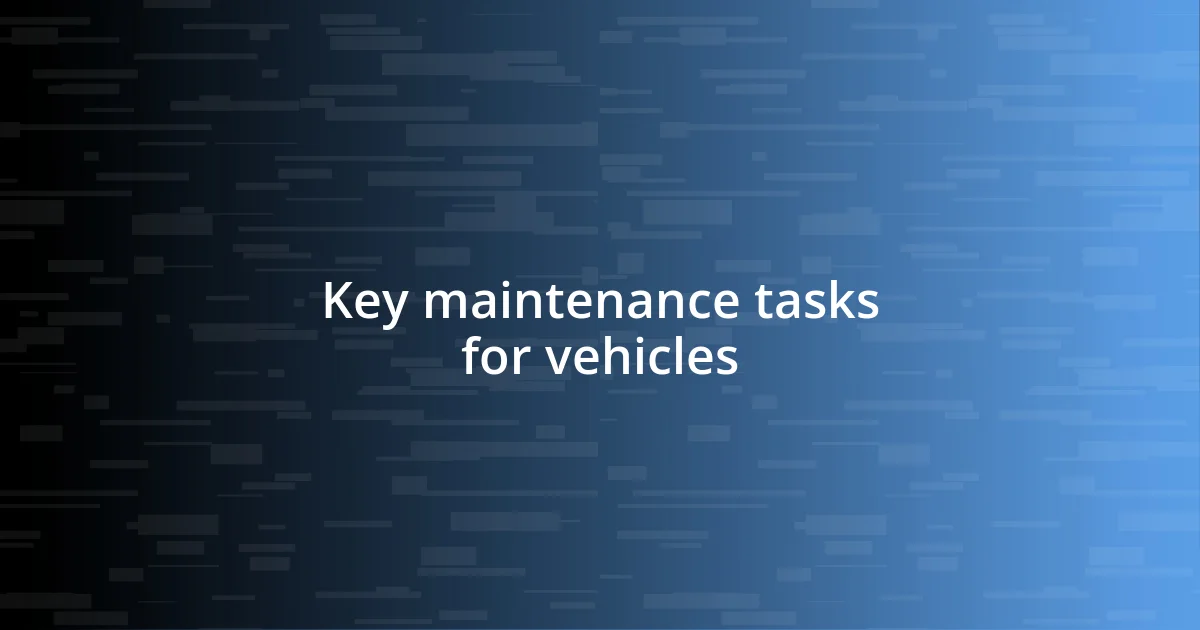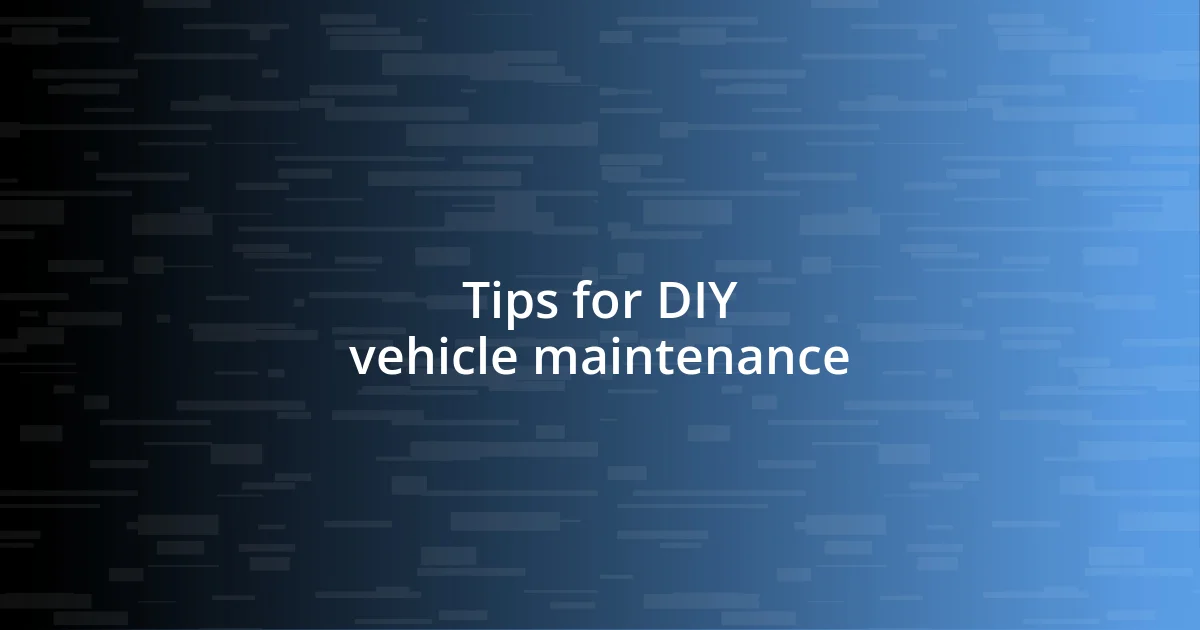Key takeaways:
- Regular vehicle maintenance is crucial for safety and can prevent minor issues from escalating into costly repairs.
- Creating a structured maintenance schedule and utilizing essential tools can empower vehicle owners to perform DIY tasks effectively.
- It’s important to know when to seek professional help and to be aware of common maintenance myths to make informed decisions about vehicle care.

Understanding vehicle maintenance needs
Understanding your vehicle’s maintenance needs is essential for its longevity and performance. I still remember the first time I ignored a small warning light on my dashboard, thinking it was just a minor inconvenience. Within weeks, that little flicker turned into a costly repair, teaching me the importance of staying vigilant about what my vehicle is trying to communicate.
Regular maintenance isn’t just about extending the life of your vehicle; it’s also about ensuring your safety on the road. One time, during a routine oil change, the mechanic discovered worn brake pads that I hadn’t noticed. That moment underscored the reality that proactive checks can prevent potentially dangerous situations. Has there been a time when you neglected a small issue that escalated quickly?
Understanding what your vehicle needs involves reading the owner’s manual, but I find that paying attention to how my car behaves offers even deeper insights. For example, I notice when my car starts to sound different or if it’s not handling as smoothly. These small indicators are like whispers from my vehicle, guiding me toward the necessary maintenance before issues escalate.

Key maintenance tasks for vehicles
Car maintenance can feel overwhelming at times, but breaking it down into key tasks makes it manageable. One of my go-to routines is checking the oil regularly; I’ve learned the hard way that running low can lead to serious engine trouble. I’ll actually set a reminder on my phone every few months to double-check that level and ensure it’s at a safe point—I can’t stress enough how reassuring that small step can be.
Here are some key maintenance tasks to keep your vehicle running smoothly:
- Oil Changes: Every 3,000 to 5,000 miles, depending on your vehicle and oil type.
- Tire Rotation and Alignment: Check every 5,000 to 7,500 miles to promote even tire wear.
- Brake Inspection: Regular checks can prevent unexpected noise or issues when stopping.
- Fluid Checks: Regularly monitor coolant, brake fluid, and windshield washer fluid levels.
- Battery Care: Inspect terminals for corrosion and test battery life, especially in extreme temperatures.
It’s fascinating how small checks can lead to big security. Just last winter, I felt a little anxious about my car’s responsiveness on slick surfaces. I decided to take a closer look at my tires and found they were worn more than I thought. Replacing them before the snow hit saved me from what could have been a slippery—and quite scary—situation. You can bet now that I make tire health a priority!

Essential tools for vehicle upkeep
When it comes to essential tools for vehicle upkeep, having the right equipment can make all the difference. I remember investing in a good set of wrenches and screwdrivers; it felt like leveling up my DIY game. It’s amazing how much easier tasks become when you’re equipped with quality tools. For instance, having a reliable tire pressure gauge handy allows me to check my tire health quickly, preventing those last-minute trips to the gas station when my light pops on unexpectedly.
Another indispensable tool for my car maintenance routine is the OBD-II scanner, which I use to check for error codes. I can’t tell you how often this little device has saved me from heading to the mechanic for what turned out to be a simple reset. Just last month, I noticed my check-engine light flickering. Instead of panicking and running to the shop, I quickly diagnosed the issue myself. That empowered me to address it, feeling like I had a bit of control over the situation—like I was part of the team maintaining my vehicle’s health.
Lastly, I can’t emphasize enough the importance of a solid jack and jack stands. I love being hands-on with my vehicle, and I find satisfaction in tasks like changing my own oil or rotating tires. Using a quality jack made me feel secure while working under the car, knowing I was safe. Plus, it’s always a nice feeling to complete a maintenance task myself, even if it’s a bit messy at times. After all, there’s nothing quite like the pride of doing it yourself!
| Tool | Description |
|---|---|
| Wrenches and Screwdrivers | Essential for tightening or loosening bolts and screws during maintenance tasks. |
| Tire Pressure Gauge | Helps monitor tire health and prevents unexpected flat tires. |
| OBD-II Scanner | Diagnoses vehicle issues by checking error codes from the engine control unit. |
| Jack and Jack Stands | Used for lifting the vehicle safely to perform maintenance underneath. |

Creating a maintenance schedule
Creating a maintenance schedule has been transformational for me. At first, I would often forget important tasks, leading to anxiety about my vehicle’s condition. Now, I dedicate a few moments each month to jot down the key dates for oil changes, tire rotations, and other essential tasks, fitting them within my personal calendar. Doesn’t it feel good to have that level of organization, knowing what’s coming next?
One thing I’ve learned is that combining seasonal changes with my schedule has worked wonders. I tie my maintenance checks to the start of each season. For instance, as summer wraps up, I’ll inspect my cooling system and wipers, bracing myself for the autumn rains. I can’t explain how reassuring it is to be proactive rather than reactive; it’s like having a safety net beneath me while I drive.
Sometimes, I also add reminders for smaller tasks like checking the air filter or cleaning the interior. It might sound trivial, but having an organized list has improved my relationship with my car. I remember feeling overwhelmed before—now, I look forward to these small self-care checks that extend my vehicle’s life. Have you tried building your own schedule? You might just find it a game changer.

Tips for DIY vehicle maintenance
Getting into DIY vehicle maintenance can feel overwhelming, but I’ve found that starting with simple tasks helps build confidence. The first time I changed my windshield wipers, it was an eye-opener. I couldn’t believe how straightforward it was! Now, I tackle it regularly, and it feels empowering to keep my visibility clear without waiting for the shop. Have you had moments like that where a small task turned into a newfound skill?
Another tip that’s been a game-changer for me is to learn by watching online videos. There’s an endless supply of tutorials for almost any DIY project related to vehicles. I recall my first attempt at changing my oil—those videos made me feel like I had a virtual mentor guiding me, step by step. Watching someone else do it removed my fear of making mistakes. The satisfaction I felt after completing that first oil change was incredible. I still relish those moments when it all comes together.
Lastly, I make it a point to document my maintenance progress. I keep a small notebook in my glove compartment where I jot down what I’ve done and when. It might seem a bit old school in this digital age, but it’s rewarding to look back and see the changes I’ve made over time. Plus, it helps me track when things need to be done next. Have you ever kept a log? I promise it turns the process from a chore into a rewarding experience.

When to seek professional help
There are moments when I recognize that certain vehicle issues are beyond my expertise. For example, the first time my check engine light flickered on, my heart sunk. Despite trying to troubleshoot, I quickly realized that diving deeper without a professional’s insight could lead to greater problems. That’s when I learned it’s often best to seek out a mechanic for diagnostic help.
I recall a time when my car began making strange noises while turning. It’s easy to brush off these sounds or convince ourselves it’s nothing serious, but that can be a costly mistake. I decided to take it to a trusted professional, and the relief I felt when they identified a simple issue turned into a valuable lesson: sometimes listening to that little voice in my head is the wisest choice.
For me, knowing when to go to a professional also comes down to safety. If you’re ever in a situation where your brakes feel off, or there’s a persistent fluid leak, don’t hesitate to reach out for help. That peace of mind, knowing someone who knows their stuff is taking care of it, allows me to concentrate on the road ahead instead of worrying about what might go wrong. Have you faced a similar dilemma? Sometimes, a quick visit to a mechanic can prevent a larger, more expensive problem down the road.

Common vehicle maintenance myths
There’s a prevalent myth that premium fuel is always necessary for high-performance vehicles. I used to be that person—chasing after the most expensive gas because I thought it would boost my car’s performance. Then, I learned that unless your vehicle manufacturer specifically recommends premium fuel, regular gasoline gets the job done just fine. It was a relief to discover that I could save money without compromising my car’s performance. Have you ever felt compelled to splurge on something you thought was essential, only to find out it wasn’t?
Another common misunderstanding is that you need to change your oil every 3,000 miles. I remember panicking when I hit that mark, fearing that without a fresh oil change, my engine was on borrowed time. However, after conducting some research and consulting with my mechanic, I found out that modern engines often allow for longer intervals—sometimes up to 7,500 or even 10,000 miles! This realization not only saved me time but also reassured me that I was taking good care of my car while not overindulging in frequent oil changes.
One myth I’ve encountered often is the belief that all maintenance tasks need to be performed at the dealer. I used to think that taking my car to the dealer was the only way to stay on track with service while maintaining my warranty. However, many independent shops offer the same quality and expertise. I tested this out when I found a local mechanic who turned out to be just as knowledgeable as my dealer—at a fraction of the cost! Have you found a trustworthy mechanic who feels like a hidden gem? It can make all the difference in your vehicle maintenance journey.














